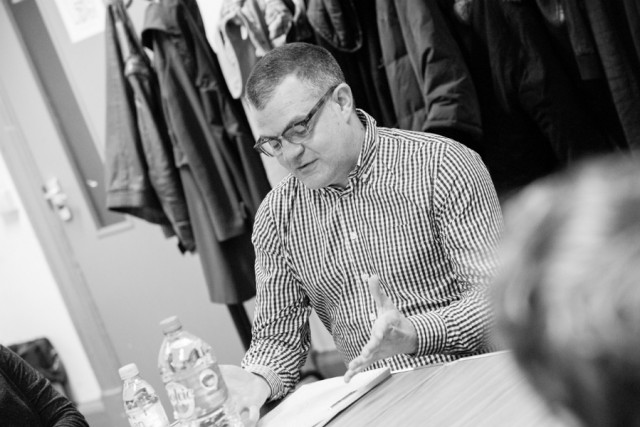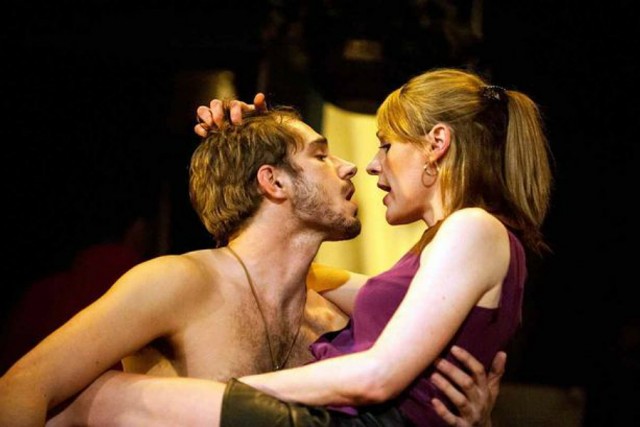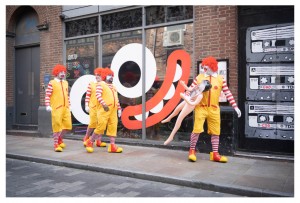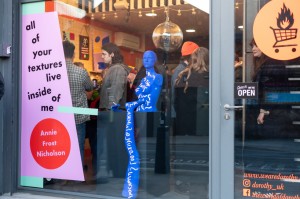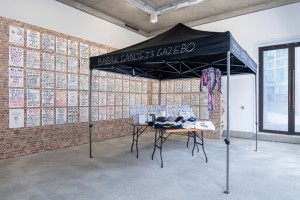Jonathan Harvey’s Beautiful Thing
Ahead of an anniversary performance opening this evening, David L Rattigan interviews Liverpool-born writer and playwright Jonathan Harvey…
I’m perched, unceremoniously I admit, on the toilet, paperback in hand. I don’t have an audience – as far as I’m aware – but if I did, they would see the widest smile ever break across my face. I’ve just reached the end of Jonathan Harvey’s 1993 play Beautiful Thing, the Liverpool-born writer’s sweet tale of teenage love in inner-city London.
Channel 4 filmed it in 1996, with a screenplay by Harvey, and a quick Google search reveals that the stage show has hardly been out of production in recent years. Indeed, any time of the year, there’s a Jamie and a Ste discovering each other somewhere on the planet.
In Beautiful Thing, it’s 1993, and sixteen-year-old Jamie Gangel lives with his feisty mother, Sandra, on the Thamesmead council estate. Classmate and next-door neighbour Ste flees his abusive father and brother, seeking refuge in the Gangels’ flat, and it’s in Jamie’s bedroom that the two lads discover romance and the courage to be themselves.
This year’s big production is the play’s official twentieth anniversary, which began its limited run in London’s West End, and comes to the Liverpool Playhouse from 28 May to 1 June. I was at the Arts Theatre for the dress rehearsal, a jubilant occasion full of the laughter and tears that its author says are at the heart, not only of the play, but of theatre itself.
Jonathan Harvey knows his craft – the success of Beautiful Thing, his BBC sitcom Gimme Gimme Gimme and his writing for ITV’s Coronation Street are all testament to that – but he’s modest and down-to-earth. When (in my nervousness) I refer to the play as A Beautiful Thing, he confesses mirthfully that the common mistake “really gets on my tits”.
Jonathan was born in Halewood and grew up in Hunt’s Cross and Wavertree. He was fortunate to have an accepting family that “could cope with this camp thing dancing around the living room”.
“I don’t think it was obvious I was gay,” he says, “they just accepted me for who I was, really. I think it was still a surprise when I came out, but that’s just what happened with families in those days.”
It was different outside the home, however, and back then “Liverpoolwas a very macho city”. There was also a culture of homophobia across Britain, enabled by legislation such as the unequal age of consent laws.
“I wrote the play in 1992, and the age of consent for gay men was twenty-one,” he explains. “That disparity of five years spoke volumes, really, and they were having all sorts of discussions in the House of Lords about lowering the age of consent, and the conversations they were having … which were broadcast every night on the telly, on the news, said nothing for me about my life or reflected anything about me. [They] went on and on about buggery, which is a word I’ve never really used… They were just obsessed with anal sex, and it was clear to me that they’d all been to boarding school and probably got buggered by their prefects, and they thought that’s what being gay was about, so of course they just wanted to clamp down on it. But that reflected nothing for me to do with being gay, so I wanted to write a story in which being gay was about falling in love and about emotions and having a laugh and finding your soul mate, but [not] about being at boarding school and being scared.”
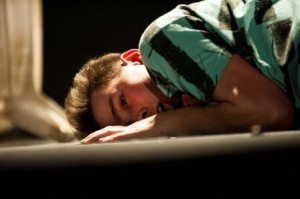
He felt the culture of inequality first-hand as a teacher in London, where he speaks of a “very forward-thinking” education authority being stifled because of Thatcher’s Section 28, which forbade the so-called promotion of homosexuality in schools. “There was legislation that said I wasn’t allowed to make out that being gay was normal,” he tells me. Jonathan was “quietly angry” about the situation. “Any writer works best when they’re angry or outraged about something,” he says.
Nevertheless, an occasional criticism of the play is that it offers a “sanitised” version of Thamesmead. The choice of music, mostly songs by Mama Cass of The Mamas and the Papas, certainly makes both the play and the film a “feel-good” experience. And Harvey doesn’t seem entirely comfortable with the “endless scenes of Ste being beaten up by his dad” that made it to the screen. But, he says, he chose to show little on the stage because he wanted to see it produced – small cast, minimal staging. “It isn’t that sanitised. I just think there’s a bit of a fairytale ending to it,” he says.
Beautiful Thing has moments of intense drama and believable characters that develop as we see more of their true selves: the bitchy mother who will fight for her kid till her last breath; the weird son and the quiet neighbour who unexpectedly find happiness in each other’s arms; the secondary school dropout, Leah, whose immature exterior gives way to an inner innocence when she sings. Director Nikolai Foster boldly draws out the most intimate moments in the play, and Harvey notes that it runs for fifteen minutes longer than most productions.
But it also has hilarity. I found that hard to appreciate in the film, and it doesn’t always come across immediately on the page, especially with the author’s fairly sparse directions. But plays were meant for performing, and watching Beautiful Thing in a theatre of three hundred (mostly gay men) was a different experience. When the line “There’s a box of autumnal shades by my bed” gets one of the evening’s biggest roars of laughter, something of a gay or camp sensibility to the dialogue becomes apparent. That wasn’t in Jonathan’s mind when he wrote it, however. “I wrote it for myself more than anything,” he says.
I ask Jonathan whether he wrote it as a drama or as a comedy.
“It was a comedy. It was the seventh play I’d written,” he recalls. “The two emotions you can hear in a theatre are laughter and tears, and I suppose on the back of that … I’ve been quite insistent on demanding that I can hear both from the audience, because if you couldn’t hear that, then they must be bored rigid, if there was just silence, you know. A more intelligent and articulate playwright might be able to do that and get away with it and feel happy, but I really like hearing an audience laugh.”
Another question often asked is whether Beautiful Thing is a ‘gay play’. Does the moniker do justice to what is essentially a love story?
“Obviously there was a ‘gay agenda’ in writing it,” Jonathan says, “but beyond that I don’t really care how people want to describe it, as long as it’s a good play.”
For this unabashed Beautiful Thing fanboy, the title speaks for itself. It’s a play about all things beautiful – people discovering the beauty in themselves and each other, unexpected moments in an often-depressing and oppressive world. Much like my reading experience on the loo, it’s about recognising the joys in the toilet that is life, isn’t it?
David L Rattigan
Beautiful Thing runs at the Liverpool Playhouse from tonight Tues 28 May-1 June 2013

